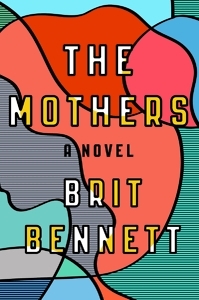Maternal Longing
Mothers—absent and otherwise—are the dynamic force at the center of Brit Bennett’s debut
The title of Brit Bennett’s emotionally smoldering debut novel, The Mothers, refers to many of its primary characters, as well as to a pulsing motif woven throughout the story. But it’s also a nod to the church women who form a chorus that embellishes and anchors the narrative. It is from these mothers that we first hear of Nadia Turner’s secret: “All good secrets have a taste before you tell them, and if we’d taken a moment to swish this one around our mouths, we might have noticed the sourness of an unripe secret, plucked too soon, stolen and passed around before its season. But we didn’t.”

Seventeen-year-old Nadia Turner grew up attending Upper Room Chapel, a traditionally African-American congregation in Oceanside, California. She is sharp-witted and beautiful, and she has won a scholarship to a top-tier university that has put her on track to be the first in her family to attend college. But her life of AP classes and summer jobs has been upended by her mother’s recent suicide. Her father, a Marine, spends much of his free time doing favors for church groups and helping them haul things in his truck, distracting himself from his own heartbreak. Robert Turner “propped his sadness on a pew,” in Nadia’s view, but his daughter “put her sad in places no one could see.”
Taking the desire to flee her old life literally, Nadia starts riding the bus after school, frequently without a destination in mind: “Her days felt like being handed from person to person like a baton, her calculus teacher passing her to her Spanish teacher…to her friends and back home to her parents. Then one day, her mother’s hand was gone and she’d fallen, clattering to the floor.” In her grief, she removes herself from those who might offer support at such a crucial point, and her father—the only person in her life directly responsible for her well-being—is in too much of a fog to be any help at all. After her afternoon bus trips, Nadia comes home and observes that father “always looked surprised when she unlocked the front door, like he hadn’t even noticed that she’d been gone.”
Since her mother’s death, Nadia has earned a reputation for wildness among the church ladies, though all she’s done is play pool and kiss shy Marines in the Camp Pendleton pool hall. The mothers see Nadia as “young and scared and trying to hide her scared in her prettiness.” But while they correctly intuit her suspended emotional state, it’s awhile before they get wind of what comes next.
 The mothers don’t just gossip—they also pray. Just don’t call them prayer warriors: “A man must’ve come up with that term—men think anything difficult is war,” Bennett writes. “But prayer is more delicate than battle, especially intercessory prayer…You close your eyes and listen to a request. Then you have to slip inside their body. You are Tracy Robinson, burning for whiskey…You are Earl Vernon, washing dirty knots out of your strung-out daughter’s hair. If you don’t become them, even for a second, a prayer is nothing but words.”
The mothers don’t just gossip—they also pray. Just don’t call them prayer warriors: “A man must’ve come up with that term—men think anything difficult is war,” Bennett writes. “But prayer is more delicate than battle, especially intercessory prayer…You close your eyes and listen to a request. Then you have to slip inside their body. You are Tracy Robinson, burning for whiskey…You are Earl Vernon, washing dirty knots out of your strung-out daughter’s hair. If you don’t become them, even for a second, a prayer is nothing but words.”
One day Nadia winds up at Fat Charlie’s Seafood Shack about a month after losing her mother, and her rudderlessness finds focus in Luke Sheppard, a handsome former football star who also happens to be the Upper Room pastor’s son. Despite the age difference, they embark on a mostly casual affair. The fling lasts only a few months, but its repercussions echo into the future for many years to come. The ghost of their affair eventually reaches out and grabs Aubrey Evans, the serious churchgoing girl with whom Nadia becomes sister-close in the aftermath of her relationship with Luke. And Aubrey, one of the novel’s more compelling and sympathetic characters, carries a wretched secret of her own.
The Mothers is a novel of gentle observations and wry wisdom—and one that offers more questions than answers, to its great credit. Who can understand the private motivations of others, or know for sure what might have come from different choices? Bennett, with a very light but loving touch, captures life in all its messy, unsentimental glory. In writing as precise as it is lyrical, she transmits the sense that even she doesn’t pretend to understand completely the reason her own characters do what they do—a nod of sincere respect for their fully-realized humanity.

Kathryn Justice Leache is a freelance writer who lives with her family in her hometown of Memphis. Her life among books has included work as a librarian and stints as a bookseller at Square Books in Oxford, Mississippi, and The Booksellers at Laurelwood in Memphis.


